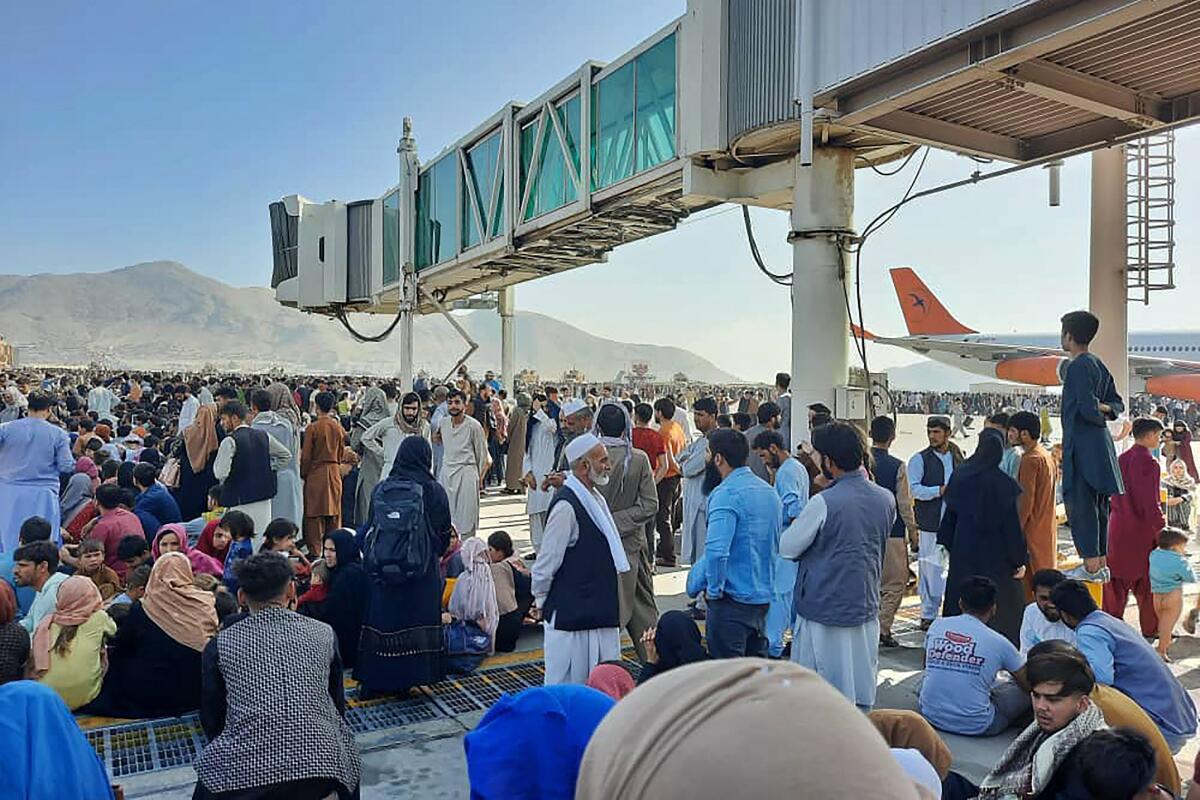What will the disastrous fall of Kabul mean for voters in 2022?

- Share via
If there’s one thing President Biden could take comfort in this week, given the Afghan debacle, it might be this: Voters have remarkably short attention spans.
By the 2022 midterm elections, and certainly by 2024, other issues likely will be front of voters’ minds — issues closer to home. The question is whether this humiliatingly tragic saga so damages Biden’s claim to competence — a claim buttressed by his stewardship of the COVID-19 vaccine mobilization — that it will threaten what he wants voters to be focused on by next year: The success of his potentially transformative domestic agenda, a multiyear, multitrillion investment in physical and human capital.
Will Biden’s embarrassment over the chaos in the military’s exit so rattle the swing-vote lawmakers in both parties, whose votes he needs, that they think twice about supporting him on the hard votes ahead?
The humiliation sure didn’t help, especially when you consider what Biden had been counting on since he called for the withdrawal from Afghanistan in April — that voters could credit him as the president who ended the endless war.
Many still will. Despite the anvil of criticism that’s fallen on Biden from the elites (myself included) for effectively abandoning countless Afghan allies to brutal Taliban rule in the rush to exit, average Americans’ support for getting U.S. troops out of Afghanistan was the rare issue that united left and right in this dangerously polarized nation.
The public will be more forgiving of Biden. That is particularly likely since blame for the ignominious end in Afghanistan is spread among presidents of both parties and a bazaar of corrupt, hapless Afghan “leaders.” How galling that the name of the Kabul airport where Americans and Afghans swarmed to escape “honors” Hamid Karzai, the longtime president who left a legacy of corruption, election fraud and complicity in his half brother’s drug trafficking and double-dealing against the United States.
For years, polls have shown the U.S. public’s apathy toward the war in Afghanistan and an eagerness to withdraw. Soon after Biden’s April announcement, Frank Newport, senior scientist at the Gallup Poll, wrote that he didn’t expect “significant pushback from the American public.” An Associated Press-NORC poll in September — a time when both Biden and then-President Trump were calling for an end to the war — showed more than 6 in 10 Americans supported a total withdrawal or at least a decrease in the already minimal number of troops.
In Gallup’s monthly polling updates over time, virtually no Americans cited Afghanistan as an important problem for the nation. “Forgotistan” is what Paul Rieckhoff, the founder of Iraq and Afghanistan Veterans of America ruefully called it. Among both veterans and Americans overall, nearly 6 in 10 said the war in Afghanistan was not worth fighting, according to surveys by the Pew Research Center in July 2019. As Afghanistan imploded this weekend, Rep. Ruben Gallego, an Arizona Democrat and a Marine veteran of the Iraq war, tweeted, “I haven’t gotten one constituent call about it and my district has a large Veteran population.”
Democratic pollster Peter Hart, who for decades surveyed opinions for the Wall Street Journal and NBC News, said he expects most Americans are reacting with “relief rather than recriminations” after a 20-year war that cost more than $2 trillion and the lives of 2,448 U.S. troops (as well as the lives of more than 100,000 Afghan soldiers, police and civilians).
“Our involvement in Afghanistan never had the kind of emotional stake that Vietnam or even Cuba had,” he told me. “The statistics may suggest Americans should have been more engaged, but psychologically, Afghanistan never had the same emotional effect on the voters.”
A new poll released Tuesday did give Biden and Democrats some reason to worry. The survey by Morning Consult/POLITICO, conducted Aug. 13-16 as Afghanistan cities toppled to the Taliban — found that Americans’ support for withdrawal had slid 20 points, to 49%. The partisan divide was stark, with Democrats more than twice as likely as Republicans to express support.
This one poll was taken amid the heartbreaking havoc playing out on our TVs. And there may be more harrowing images in coming months as the restoration of the Taliban brings medieval repression and atrocities. But Americans, who tuned out Afghanistan for all the years U.S. troops were there, will almost certainly turn the channel once they’re gone.
And as much as Republicans are trying to exploit the administration’s failure in planning for the exit to their political advantage, they’re greatly handicapped in using this cudgel against Biden and his party.
Trump last year elevated the Taliban to legitimacy on the global stage, making about the only deal of his presidency with the militants — a deal so bad, especially in retrospect, that this week the Republican National Committee removed praise for it from its website.
He wanted to leave more quickly and claims now he’d have done so flawlessly — this from the man who botched the response to the pandemic with such deadly results. Michael R. Pompeo, his secretary of State and a potential Republican presidential aspirant, negotiated the deal that freed about 5,000 Taliban fighters, some of whom reportedly helped seize Kabul this week.
More than ever, Biden and his party have to deliver the infrastructure bills that he’s promised. Afghanistan has set back what he’s laid out as the defining goal of his presidency: To counter the global rise of autocracies by proving that the United States and other democratic powers can do big things, and competently. Now do it.
More to Read
A cure for the common opinion
Get thought-provoking perspectives with our weekly newsletter.
You may occasionally receive promotional content from the Los Angeles Times.










